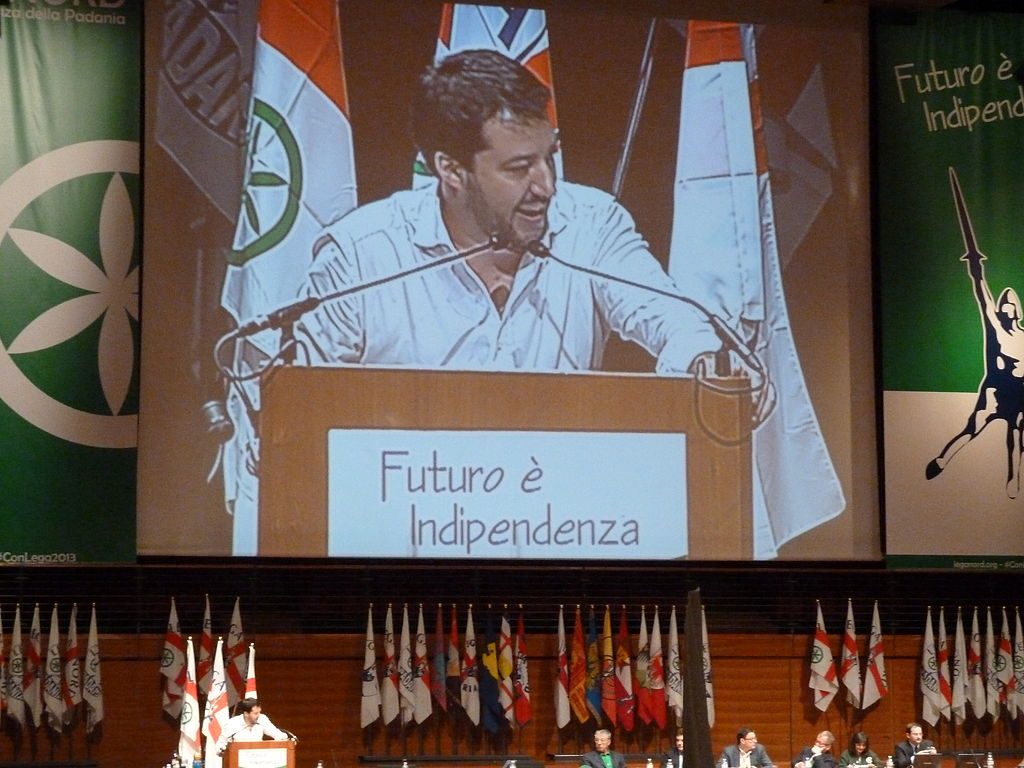
Mankind’s ‘march of folly’ down the centuries has always progressed in lockstep with circumstances and events that contradict each other, whether absurdly (IBM famously predicting there would never be a mass market for computers) or tragically (Adolf Hitler’s prewar declaration that ‘international peace’ was the ultimate goal of German power). Yet never has there been a perhaps more striking example of historical irony than the fact that the ideology once responsible for the near-destruction of Western civilization is today the rational philosophy most capable of saving it: Nationalism. Specifically, that of the rise of European nationalism in the past decade, but particularly and most vigorously within the last five years. This continental as well as British political movement has been in response to one main phenomenon and one only: that of excess. That is, it is a reaction against the overwhelming excesses of migration most of all, but also a reaction to Brussels-born economic bankruptcy and the sovereignty-destroying reach of the bureaucrat-class of the EU colossus. And the ascendancy of this new “Right” could not be more natural—or more needed, at long last.
“We are beginning to see that men are more closely related to the groups to which they belong: family, community, and religious organization-than to any interest which could be more specifically called merely personal. There is a rapidly developing individualism that is distinctly social, and which promises to become a powerful factor in human affairs.” Those words were written by historian Herbert Adolphus Miller in 1914, and could just as well have been written yesterday. The individualism here spoken of is that of the return of individual conscience; of liberation from state-sanctioned thought, word and deed; of sovereignty of the individual as the main unit of the sovereignty of the nation. It is this “sentiment” that has resurfaced again Europe, and in full, though not yet complete, force. The words of General Charles de Gaulle seventy years ago summed this feeling up most succinctly:“Nations are the fundamental reality of history and the essential task of political leaders is to defend the national patrimony against all who think of infringing it.” Everything old is new again and plus ça change…
Today’s “nationalists” in this regard are rational and sane, hardly fitting the’ “far-right” and “extremist” lingual straitjackets fashioned by contemporary transatlantic media. Interminably depicted as having been born from some kind of panicky malaise infected by demented populism, irrational Islamo- or Afro-phobias, and “hatred” for the ongoing noble pan-European experiment, it has been nearly impossible on these shores to obtain proper perspective on the various “Right”-leaning parties and their sound policies. It has been only possible to glean some information on them by scouring subterranean reaches of alternative online media. But familiarity with the principal who’s who is essential to know.

These parties and personalities include: Italy’s Deputy Prime Minister Matteo Salvini, who recently founded the new European Alliance of National Parties; Nigel Farage and his Conservative Party in England, Geert Wilders of the Party for Freedom in the Netherlands, the Le Pen family of France, Anders Vistisen of the Danish People’s Party and Pia Kjaersgaard, former leader of that party and current Speaker of the Danish Parliament; the Finns Party, Richard Jomshof of the Swedish Democrats, Alice Weidel and the Alternative für Deutschland (AfP) and Viktor Orban as leader of the Fidesz Party of Hungary. There is also the Law and Order Party in Poland and the colorfully un-PC Polish EU parliamentarian Janusz Korwin-Mikke, a devoted Margaret Thatcher acolyte who once protested high taxes by eating his tax returns at the Polish Revenue Office live on television and also commented that anyone who gives money to an unemployed person “should have his hand cut off because he is destroying the morale of the people.” Concern for Twitter shadow-banning is not a particular worry among such politicians and leaders.
Even prominent, former heads of state have stepped back onto center stage to defend the new nationalist sentiment. “Multiculturalism and human-rightism promote the notion that migration is a human right, and that the right to migrate leads to further rights and entitlements, including social welfare hand-outs for migrants”, stated former Czech President Vaclav Klaus and economist Jiri Weigel in their book Europe All Inclusive, as quoted on the Gatestone Institute website. Klaus continues: “Europe is weakened by the leftist utopia of trying to transform a continent that was once proud of its past into an inefficient solidaristic state, turning its inhabitants from citizens into dependent clients”.
These are just a few among many figures in comprising the new wave of European nationalism, better described simply as activist patriotism, for the raging zealotry and goose-stepping “hatemongers” of mainstream media fantasy are very few, if any, to be found. For, when one actually goes to the source and listens to these individuals present their respective views, one discovers a general movement made up of a common intellectual-social sentiment that believes in the defense of borders, in national identity and in cultural integrity. But, the price of expressing mature and honest convictions expressed that all experience and few will admit to that these leaders have seen their views censored, deliberately misrepresented or ridiculed. Such offenses include:

One of the founding fathers of the modern nationalist movements is Jean-Marie Le Pen, the founder of the National Front in France and called “the last samurai of politics” (perhaps a nod to the actor Alain Delon, a strong supporter of Le Pen) or, conversely, “the Devil of the Republic” depending on one’s love-hate views of this feisty Gaul. Active in the NF until somewhat theatrically expelled by his daughter, Marie Le Pen, in 2015 (while staying on a few more years its honorary president), the tenacious Breton, born in 1928 and raised as an orphan, remained a member of the European Parliament until mid- April 2019. It was Le Pen’s party that rose to fame in the 80’s in calling to attention the rising violence and social dissolution that was resulting from immigration—a call to arms that, speaking of ironies, came from someone who was the first French politician to nominate a Muslim candidate, Ahmed Djebbour, an Algerian, elected in 1957 as deputy of Paris.
In recent years the “biggest threat to Europe”, as the likes of TIME and CNN would have it, is Italy’s anti-immigrant “Lega”, highly popular in Europe’s third largest economy and led by Salvini who enjoys direct confrontation with Brussels. Switzerland’s Swiss People’s Party, led by Trump-admirer Christoph Blocher, has committed to making the country’s already tough asylum and immigration laws even more strict, criticizing the high proportion of foreigners among the public insurance benefit recipients and other social welfare programs. They were also the party to push through the minaret-ban in the country, which in In November 2009 won the majority vote (57.5%) and became an amendment to the Swiss Constitution. However, the four existing minarets are not affected by the new legislation. The international media and the United Nations came down hard on Switzerland, mocking its image as a bastion of neutrality and tolerance. But the words of one American writing to The New York Times on November 30, 2009 in response to reporting on that Swiss referendum sum up what could be described as the general feelings of European citizens (or “populists”, if one must):
“Being an American living in Switzerland (indefinitely with a Swiss husband) I feel this ban is in direct response to the people's feelings on immigration in general in Switzerland, and not specifically religion related. Swiss citizens are no longer comfortable with the level of immigrants and safety concerns coming from that. There are places in my city I will no longer visit during the day because of violence from immigrants (be it legal or illegal).
And from people I have talked to that have voted against the minarets, their reasons were that Muslim immigrants, in general, have refused to integrate themselves to the Swiss culture. Italian immigrants, Portuguese immigrants before them have. And these newer immigrants, eastern European, Muslim or not, have not done so.”
In Sweden, the Swedish Democrats first entered parliament in 2010 but really broke through in 2014 when they took thirteen percent of the vote and were tough on the country’s stunningly open migration policy long before “Rape Capital of Europe” started to circulate as the grotesque distinction most identified with that violence-beleaguered country. The AfD, in Germany, took 94 parliamentary seats out of 709 and threw Germany’s traditional balances of power off center, becoming first the eminence grise and now bêtenoire of Chancellor Merkel in relatively few years, whose attempt at a counter-“grand coalition” is by far the weakest government Merkel has ever led.

Then there is the ever-newsworthy Viktor Orban of Hungary, against whom the European Parliament, led by Jean-Claude (“the European Parliament is ridiculous, very, very ridiculous”) Juncker, once again began censure proceedings this past February. As TIME reported in September 2018 when Orban was up for censure then:“Orban has spent the last few years systematically undermining judicial independence in the country, targeting NGOs (particularly those backed by Hungarian-American liberal philanthropist George Soros) and stymying the country’s free press.
Orban refuses outright to accept the EU’s plan to redistribute asylum seekers across the political bloc. “The Hungarian people have decided that their country is not going to be a country of migrants”, he toldthe European Parliament the day before the censure vote. Even TIME had to admit that it is “this kind of defiance to Brussels bureaucracy” that gave the Hungarian prime minister his last electoral victory. Indeed, it is.
In 1914, Dr. Miller, the scholar cited at the beginning of this essay, wrote that the world was “organizing itself into two great camps-Socialism and Nationalism” with both being “expressions of the group feeling… movements of revolt…struggles for freedom.” He wrote: “They started from a common impulse about fifty years ago, but quickly found themselves arrayed against each other. One would break down political boundaries; the other would build them up. Socialism calls all the world one; Nationalism sets part against the rest. Socialism is economic; Nationalism sentimental. Both are rapidly becoming world-wide and must fundamentally modify statecraft”.
It is perhaps another great irony—or, not one at all—that those words could apply to the political landscape of the West today. One of these sets of belief is the plaything of state micromanagement and dictatorial by-any-means-necessary human abuse. The other recognizes that man is born skeptic, is by nature conservative and bases his philosophy not on how he ought to live but upon how he actually has lived. “Experience”, wrote Miller, “[man’s] great teacher has shown that conservatism is more than a counterpoise to radicalism”. It is a natural feeling, authentic and enduring.
“Civilizations grow through an élan that carries them from challenge to response to further challenge and from differentiation through integration to differentiation again”, wrote another outstanding historian, Arnold J. Toynbee. It is Europe’s—and the West’s—great hope that the sense of identity that comes with an appreciation for historical legacy will continue to define the healthy nationalism now poised to reinvigorate Europe after decades of a Dark Age descent into self-obliteration.
Subscribe to our evening newsletter to stay informed during these challenging times!!
The nationalists real problem is the minorities ` rights.